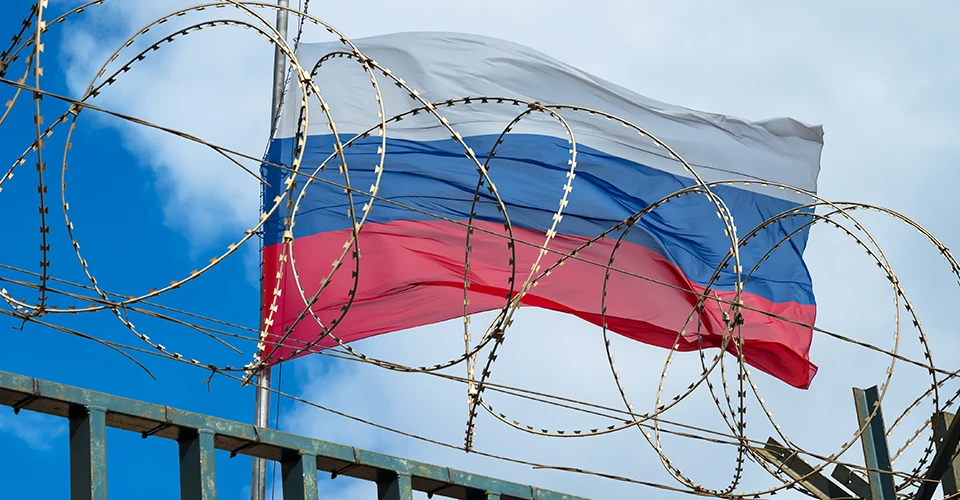
EU bolsters Russia sanctions, fearing Trump may shift policy if re-elected
European diplomats are working to reinforce sanctions on Russia, anticipating that former U.S. President Donald Trump’s return could weaken Western attempts to isolate Moscow
Reuters reports this.
Discussions among EU officials and envoys are focused on various measures to ensure that European sanctions remain in place over the long term, strengthening them through stricter enforcement, even if Washington shifts its approach.
The potential measures include “catch-all” provisions to detect and block suspicious shipments bound for Russia, along with broader restrictions on oil shipping, the sources indicated.
There are also talks about modifying the rule that requires European capitals to renew the freeze on Russian central bank assets—the largest individual Western sanction on Moscow—every six months, according to sources who requested anonymity due to the issue's sensitivity.
The diplomats said that a few member states are working on a "catch-all" clause idea, aimed at covering either battlefield-related goods or a broader range of prohibited exports.
The clause would enable customs officials to delay shipments if the destination appeared unusual, such as routes passing through Russia to reach Central Asian countries. Preparations are being made in case Washington's position changes if Trump is reelected.
“Any softening by Washington would leave Europe in a difficult position, as it is the United States, with sweeping powers to punish sanctions busting globally, that primarily enforces the rules,” the report says.
The European Union is now seeking ways to strengthen its enforcement and enhance its restrictions on Russia.
Tom Keatinge, of think tank the Royal United Services Institute, said European policy makers had been preparing "autonomous European sanctions considering the possibility of a Trump presidency" but would need to enhance enforcement.
"Should a Trump presidency reverse U.S. sanctions on Russia, Europeans will need to be much more muscular in ... enforcement action and will no longer be able to hide behind Uncle Sam," he said.
A spokesperson for the Trump campaign stated that President Joe Biden's "weak agenda... has emboldened our adversaries and led to war in Ukraine," while criticizing Democratic presidential candidate Kamala Harris as "dangerously liberal," but did not clarify his position on sanctions.
It is noted that European countries were wrongfooted during Trump's last presidency, when the United States reversed an international deal with Iran over its nuclear programme and unilaterally reinstated sanctions, leaving Europe out on a limb.
Now, European officials worry that a similar shift regarding Russia could undermine Western efforts to isolate Moscow, according to two sources. Trump has strongly suggested on the campaign trail that he would halt or significantly reduce military aid to Ukraine if he wins the election on November 5.
He has declined to state that he wants Ukraine to win the war and has even gone so far as to blame Ukrainian President Volodymyr Zelenskiy for contributing to the start of the conflict.
“Trump has frequently praised his own 2017-2021 administration for placing sanctions on the Nord Stream II pipeline, but has not made his position on future sanctions clear, and he has said he wants to make a quick peace deal with Moscow,” the author states.
Wider sweep
European diplomats intend to postpone in-depth discussions about new restrictions until the year’s end, looking forward to Poland taking over the six-month rotating EU presidency.
Hungary currently holds the presidency and has been slow to act on sanctions. Hungarian Prime Minister Viktor Orban faced significant backlash for meeting with Russian President Vladimir Putin in Moscow, which Budapest described as a "peace mission."
The overhaul could also do away with the need to regularly reaffirm a freeze on Russian central bank assets, replacing six monthly intervals with one of 36 months, underpinning this sanction for the long term, the report says.
Assets owned by the Group of Seven (G7) major economies total approximately $300 billion, with the majority held in Europe.
Several countries are also considering measures to address the "mislabelling" of products intended for Russia, aiming for more accurate descriptions. The Baltic states that share a border with Russia have repeatedly raised concerns that exporters take advantage of EU customs codes.
EU member states are engaged in initial talks about the framework for a 15th package of sanctions after several months of inactivity since Budapest assumed leadership on July 1.
According to one source, at least 45 ships are expected to be included in the EU sanctions list as Western allies aim to reinforce the G7 Russian oil price cap. Western sanctions officials believe that targeting specific tankers is the most effective method to reduce Russian oil earnings.
Western powers are also beginning to apply pressure on the countries where the tankers are registered, sources said. Additionally, the EU aims to broaden the implementation of the "No Russia clause" in the upcoming round of sanctions.
This would require subsidiaries of EU companies in third countries to restrict the re-export of certain items to Russia, including goods that can be used for military purposes, as well as ammunition and firearms.
Several countries, along with the European Commission, plan to impose additional restrictions on Europe’s energy imports from Russia, including liquid natural gas (LNG) imports, which have risen in recent months.
Belgium, France, and other countries have urged the Commission to suggest methods for enhancing the monitoring of Russian LNG entering the bloc.
- News












































